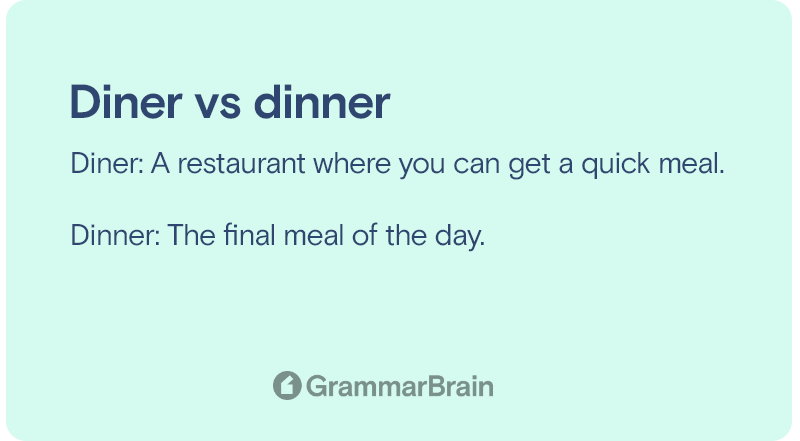“Diner” and “Dinner” are words with related meanings that often get confused or misspelled. But both have different meanings, although they are only separated by one letter.
In this article, let’s learn about diner vs. dinner and the difference between the two words.

What is a Diner?
A diner is a small restaurant that provides inexpensive meals. Diners are found all over the United States, Canada, and some regions of Western Europe. A diner offers a variety of food items in a relaxed ambiance, with direct service. Many diners have extended hours, and others are open 24 hours a day along highways and places where there is a lot of shift employment.
Typically, a diner is either a person who is eating or a modest eatery that serves American cuisine. The train car is another example of a restaurant. Dining cars are another name for these vehicles. The Diners primarily offer fast food.
What is a Dinner?
Dinner, like breakfast, is very important in the human diet. This is also the main meal, which saturates the body with microelements and simultaneously satisfies psycho-emotionally.
A delicious dinner promotes relaxation after a busy day. At the same time, dinner is a very dangerous meal. If breakfast and lunch are of poor quality or skipped, then dinner can affect weight and generally create various problems in the body.
It is vital to pay attention to dinner because, after the meal, there is a phase of rest and sleep during the body’s recovery process.
For quality sleep, you need to have quality dinner. In this case, the body has time to digest food and then use the benefits of microelements all night in the recovery process.
Difference Between Diner and Dinner:
Diner and Dinner are nouns having a variety of connotations that are all connected to eating in some manner. As you can see, this similarity might lead to misunderstandings. So, let’s know about diner vs dinner.
A diner is a term that can be used to describe a person who eats, a dining car, or a casual restaurant serving inexpensive cuisine.
The most important meal of the day is called “dinner” in the noun form. This is typically the third meal of the day in everyday situations.
Example and Uses of Diner in a Sentence:
Lary’s father owns the best Diner in the park station.
I am craving some chips and a burger. Let’s go to a diner.
Kelly’s diner makes the best sausage and omelets.
The train passengers headed to the nearby diner to get a hot lunch.
I discovered a fine diner on the roadside and overindulged in delicious cuisine With all of my buddies.
Let’s hang out at ken’s diner. They serve the best fried chicken.
Example and Uses of Dinner in a Sentence:
Let’s make a turkey for today’s dinner.
Kiara is going to host the Thanksgiving dinner this year.
The majority of wedding receptions give guests two options for dinner.
The entire family gathered around the television to watch their preferred home program after grabbing a TV meal.
It’s becoming late; I don’t know why nobody is coming for dinner.
Do not skip supper because it is an important meal of the day.
At 8:00 p.m., dinner will be served.
He didn’t care to eat healthily. Therefore, he virtually always had fast food for dinner.
Let’s have a fantastic meal tonight at a five-star establishment.
In review
Diner and Dinner: These words are used as nouns in sentences, and their pronunciation and meaning are distinct. In America, the word “diner” is typically used to describe someone eating a meal, a dining vehicle, or a modest and inexpensive eatery.
Dinner, on the other hand, can be a particular gathering of people for a special meal that is eaten around midday or in the evening.
FAQs
What were diners called in the 50s?
In the 1950s, diners were known as “lunch cars.” Diners had gained popularity by the 1950s, primarily due to their reasonable prices, long hours, and extensive menus.
Is diner a real word?
The verb “dine” is the root of the word “diner.” The word “dine” is derived from the late 13th-century Old French verb “disner,” which means “to have a meal.”
Inside this article
Fact checked:
Content is rigorously reviewed by a team of qualified and experienced fact checkers. Fact checkers review articles for factual accuracy, relevance, and timeliness. Learn more.
Core lessons
Glossary
- Abstract Noun
- Accusative Case
- Anecdote
- Antonym
- Active Sentence
- Adverb
- Adjective
- Allegory
- Alliteration
- Adjective Clause
- Adjective Phrase
- Ampersand
- Anastrophe
- Adverbial Clause
- Appositive Phrase
- Clause
- Compound Adjective
- Complex Sentence
- Compound Words
- Compound Predicate
- Common Noun
- Comparative Adjective
- Comparative and Superlative
- Compound Noun
- Compound Subject
- Compound Sentence
- Copular Verb
- Collective Noun
- Colloquialism
- Conciseness
- Consonance
- Conditional
- Concrete Noun
- Conjunction
- Conjugation
- Conditional Sentence
- Comma Splice
- Correlative Conjunction
- Coordinating Conjunction
- Coordinate Adjective
- Cumulative Adjective
- Dative Case
- Determiner
- Declarative Sentence
- Declarative Statement
- Direct Object Pronoun
- Direct Object
- Diction
- Diphthong
- Dangling Modifier
- Demonstrative Pronoun
- Demonstrative Adjective
- Direct Characterization
- Definite Article
- Doublespeak
- False Dilemma Fallacy
- Future Perfect Progressive
- Future Simple
- Future Perfect Continuous
- Future Perfect
- First Conditional
- Irregular Adjective
- Irregular Verb
- Imperative Sentence
- Indefinite Article
- Intransitive Verb
- Introductory Phrase
- Indefinite Pronoun
- Indirect Characterization
- Interrogative Sentence
- Intensive Pronoun
- Inanimate Object
- Indefinite Tense
- Infinitive Phrase
- Interjection
- Intensifier
- Infinitive
- Indicative Mood
- Participle
- Parallelism
- Prepositional Phrase
- Past Simple Tense
- Past Continuous Tense
- Past Perfect Tense
- Past Progressive Tense
- Present Simple Tense
- Present Perfect Tense
- Personal Pronoun
- Personification
- Persuasive Writing
- Parallel Structure
- Phrasal Verb
- Predicate Adjective
- Predicate Nominative
- Phonetic Language
- Plural Noun
- Punctuation
- Punctuation Marks
- Preposition
- Preposition of Place
- Parts of Speech
- Possessive Adjective
- Possessive Determiner
- Possessive Case
- Possessive Noun
- Proper Adjective
- Proper Noun
- Present Participle
- Prefix
- Predicate



